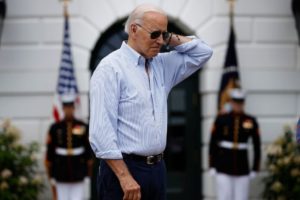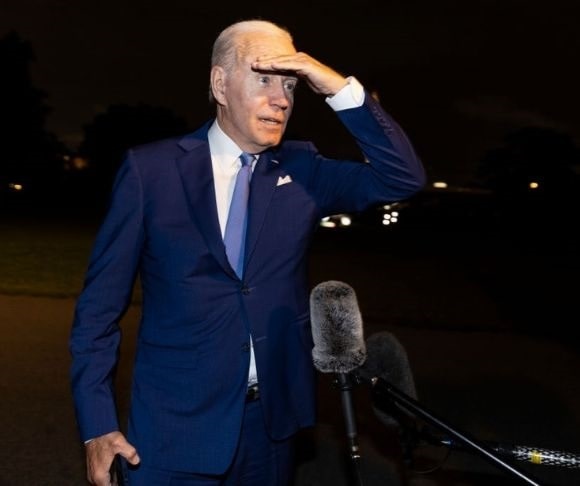President Joe Biden brought a jerrican to Riyadh when he met with Crown Prince Mohammed bin Salman Al Saud, colloquially known as MBS. After fist-bumping the royal leader in a moment seen around the world, Biden failed to secure significant commitments for Saudi Arabian oil. But the White House is optimistic that the Saudis will persuade the Organization of Petroleum Exporting Countries (OPEC) and its allies, OPEC+, to increase production efforts to stabilize global energy markets. Investors are doubtful this will occur as crude futures rallied past $100 a barrel again on the July 18 trading session, even with recession fears decimating the commodities arena this month.
Saudi Arabian Oil Won’t Save Biden
 The consensus of many industry observers and market analysts was that the president was unlikely to nudge the Kingdom into opening the taps and flooding the world with black gold. This prognostication was accurate as MBS essentially dismissed Biden’s request, choosing to offer him crumbs by raising output to 13 million barrels per day (bpd), up from about 12.5 million bpd. The Energy Ministry noted earlier this year that it aimed to raise production capacity to 13.5 million bpd by 2027.
The consensus of many industry observers and market analysts was that the president was unlikely to nudge the Kingdom into opening the taps and flooding the world with black gold. This prognostication was accurate as MBS essentially dismissed Biden’s request, choosing to offer him crumbs by raising output to 13 million barrels per day (bpd), up from about 12.5 million bpd. The Energy Ministry noted earlier this year that it aimed to raise production capacity to 13.5 million bpd by 2027.
MBS reiterated that the nation’s oil and gas sector does not possess the capacity to increase output anymore at this time while also throwing shade on the president’s broader green energy agenda.
“We also stress the importance of continuing to inject and encourage investments in fossil energy and its clean technologies over the next two decades to meet the growing global demand, with the importance of assuring investors that the policies adopted do not pose a threat to their investments to avoid their reluctance to invest and to ensure that no shortage of energy supply would affect the international economy,” he said in his address.
The Saudi Arabian oil sector is running at or near full capacity, something that French President Emmanuel Macron whispered to Biden in June. In addition, the Middle Eastern state has refocused its economic position on Asia, particularly India and China. Members of the cartel are still trying to resuscitate their finances following the brutal collapse in 2020.
Reuters exclusively obtained new ship tracking data from Refinitiv Eikon. It revealed that the world’s largest oil exporter more than doubled its Russian fuel imports in the second quarter, a move that would allow utilities to meet summer cooling demand and enable the Saudis to free up crude exports. Riyadh imported 647,000 tons (48,000 bpd) of fuel oil from Russia through Russian and Estonian ports during the April-June period as the kingdom took advantage of Russia’s discount rates.
On a couple of occasions since moving to 1600 Pennsylvania Ave., Biden has requested OPEC to open the floodgates and allow everyone else to profit from $100 oil prices, except for US workers. But the group essentially dismissed his pleas by feigning concerns over COVID-19 waves. Indeed, everyone had written OPEC’s obituaries once the United States became energy independent and prices collapsed below zero. But now OPEC has taken revenge on the West by refraining from generating more production.
The Next Key Trends

Joe Biden (Photo by Chip Somodevilla/Getty Images)
In the second half of 2022, there will be several trends to monitor in the global energy market. Now that China is injecting the economy with $250 billion in stimulus, market experts say that Beijing will be importing more oil from worldwide producers. Russia is trying to establish a global price benchmark as part of the de-dollarization push and simultaneously threatening to shut off Europe’s lights. US drivers might be trimming their travels in response to $5 gasoline. US firms are trying to drill more, despite the federal government making their lives harder. Finally, will oil prices firmly fall below $100 by the year’s end?
All for Nothing
What did President Biden hope to achieve exactly? Following his four-day trip to the Middle East, it is unclear if the president was confident in his negotiation abilities or if he was tossing a Hail Mary pass. Whatever the case, the only thing he may have accomplished was sacrificing his last ounce of integrity by abandoning his 2020 campaign pledge to make the “pariah” state “pay the price” for the 2018 killing of journalist Jamal Khashoggi. All for the sake of outsourcing America’s energy needs to a foreign regime rather than turning to the reliable US oil and gas sector.




